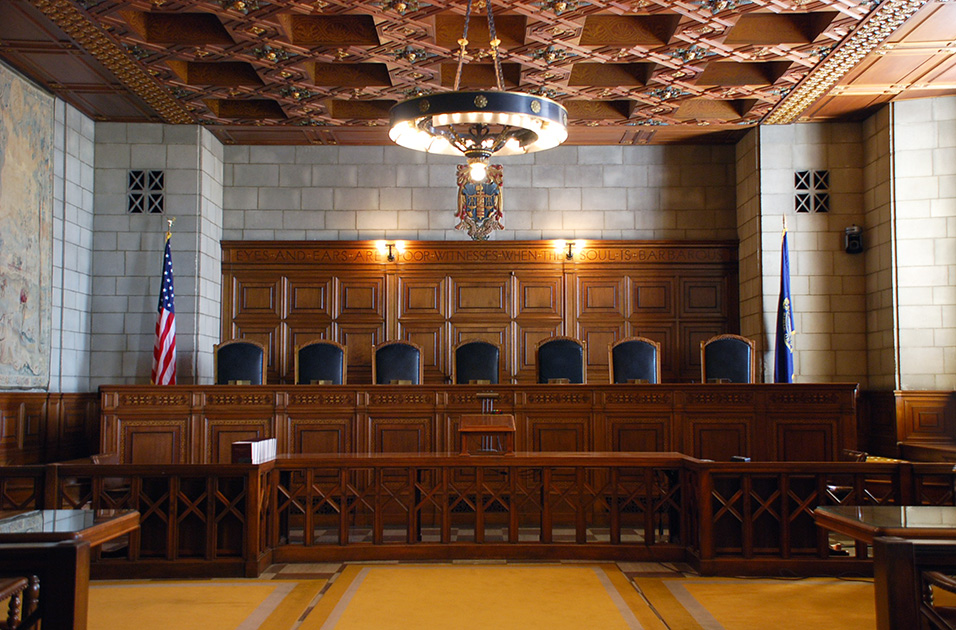Politics
Nebraska Supreme Court Upholds Law Restricting Abortion and Transgender Youth Medical Care

The Nebraska Supreme Court upheld a law on Friday that combines restrictions on abortion with measures limiting gender-affirming health care for minors. The court ruled that the law does not breach the state constitutional amendment requiring bills to address only a single subject.
While acknowledging that abortion and gender-affirming care are distinct, the majority opinion determined that both fall under the broader category of medical care. Chief Justice Mike Heavican, writing for the court, referenced a passage from a 1895 ruling to support the finding that a bill with a single general object, even if broad, adheres to the state constitution’s single-subject rule as long as it is clearly expressed.
The case was brought by the American Civil Liberties Union (ACLU) on behalf of Planned Parenthood of the Heartland. The ACLU argued that the combined law violated Nebraska’s single-subject rule. However, the court rejected this argument, upholding the law.
The law, combining a 12-week abortion ban with restrictions on gender-affirming care, emerged from the Nebraska Legislature’s 2023 session. Initially, separate bills were proposed: one for an abortion ban at around six weeks and another to restrict gender-affirming treatments for minors. After the six-week ban faced a filibuster, the Legislature incorporated it into the gender-affirming care bill.
The law faced significant controversy, including a prolonged filibuster by a few lawmakers trying to block its passage. A district judge had previously dismissed the lawsuit challenging the law, leading to the ACLU’s appeal.
During arguments before the high court, the state’s attorney argued that the combined measures fell under the subject of health care, while Planned Parenthood contended that the Legislature treated abortion and transgender care as separate subjects initially.
Justice Lindsey Miller-Lerman’s dissent criticized the majority for applying different standards to legislative bills compared to voter referendums, citing a 2020 case that blocked a medical marijuana initiative for violating the single-subject rule. She accused the majority of favoring legislative flexibility over constitutional adherence.
Following the U.S. Supreme Court’s 2022 overturn of Roe v. Wade, many Republican-controlled states have enacted various abortion bans. Currently, fourteen states ban abortion at all stages with some exceptions, and three others impose bans after about six weeks. Nebraska and North Carolina have introduced bans at 12 weeks.
Additionally, many GOP-controlled states have enacted restrictions on gender-affirming care for minors, with twenty-two states currently enforcing such measures. In contrast, several Democratic-controlled states have worked to safeguard access to both abortion and gender-affirming care.
In Nebraska, voters may ultimately decide the future of abortion access, with two questions likely to appear on the November ballot: one to add a right to abortion to the state constitution and another to enshrine the current 12-week ban.
Politics
Trump Moves to Reshape Education System with Bold Reform Effort

In a significant policy shift, President Donald Trump has signed an executive order aimed at dismantling the Department of Education, fulfilling a key campaign promise and advancing a long-standing goal of some conservative leaders. The move is designed to redirect funding and decision-making power to individual states, emphasizing local control over education.
During the signing ceremony at the White House, Trump highlighted the importance of streamlining government operations and ensuring that resources are used effectively to improve student outcomes. Surrounded by students, he stated, “The US spends more on education than most countries, yet our students’ performance does not reflect that investment. It’s time to empower states and communities to make the best decisions for their schools.”
The Department of Education, established in 1979, primarily oversees student loans and federal programs for low-income students. While only about 13% of primary and secondary school funding comes from federal sources, the administration believes that decentralizing control will allow for more targeted and effective educational strategies.
A Focus on Transition and Continuity
The executive order directs Education Secretary Linda McMahon to take necessary steps to transfer authority to state and local governments while ensuring a smooth transition that maintains critical services. The White House emphasized that no immediate disruptions would occur in educational support programs.
McMahon reassured department employees in a memo, stating, “This is our opportunity to perform one final, unforgettable public service to future generations of students. Our mission is to leave American education stronger, freer, and more hopeful.”
Challenges and Next Steps
While Trump’s order sets the stage for significant change, fully closing the department would require congressional approval. Senator Bill Cassidy has already announced plans to introduce legislation supporting the effort, though it faces hurdles in the Senate. Meanwhile, the administration is expected to reduce the department’s funding and reassign certain programs to other federal agencies, ensuring an efficient allocation of resources.
As the administration moves forward with its education reforms, the focus remains on strengthening opportunities for students, reducing bureaucracy, and ensuring states have greater control over their educational systems. The coming months will determine how these changes unfold and what impact they will have on the future of American education.
Politics
Chinese AI App DeepSeek Sparks Market Turmoil, $500bn Wiped from Nvidia and US Tech Giants

The emergence of Chinese AI app DeepSeek has triggered shockwaves across the US tech industry, leading to a significant drop in stock prices for major companies. AI chipmaker Nvidia saw its value plummet by 16%, losing $500 billion in market capitalization. Rival Broadcom also suffered a sharp decline, with shares falling 17.8%, while other tech giants like Microsoft and Meta experienced notable losses.
DeepSeek has quickly risen to become the most downloaded free app in the United States, overtaking popular rivals like ChatGPT. Its reported development cost of just $6 million has sent ripples through the industry, challenging the traditional notion that groundbreaking AI technology requires multibillion-dollar investments.
In stark contrast, companies like Microsoft and Meta have committed vast sums to AI development, with investments of $80 billion and $60–65 billion, respectively. DeepSeek’s meteoric rise suggests that a lower-cost, open-source approach may disrupt existing business models and redefine what is possible in AI.
The sudden market turmoil underscores concerns about America’s dominance in artificial intelligence. Investors are now questioning whether US tech companies can maintain their competitive edge against cheaper, innovative alternatives like DeepSeek.
Nvidia, a key player in AI chip manufacturing, experienced the most significant blow, as the app’s success has called into question the scalability and profitability of existing AI strategies reliant on expensive infrastructure.
DeepSeek’s rise highlights the potential for more cost-effective, innovative solutions in AI development. While its reported $6 million development budget remains disputed by some industry experts, it has already shifted perceptions of what achieving AI breakthroughs might cost.
This development could pave the way for smaller companies and governments to explore AI without the need for massive financial resources. In the UK, where the government is banking on AI to drive economic growth and reduce public service costs, such advancements could serve as inspiration for future projects.
Despite its success, DeepSeek’s rapid rise also raises questions about its long-term sustainability, data privacy, and the technology underpinning its platform. As researchers and analysts delve deeper into its model, the app’s low-cost development claims may face scrutiny.
The DeepSeek phenomenon has upended the AI market, challenging entrenched economic assumptions and sparking uncertainty for US tech giants.
News
Trump Signs Sweeping Executive Actions on First Day

On his first day back in office, President Donald Trump signed an array of executive actions aimed at swiftly implementing his administration’s priorities. These measures reflect his campaign promises and address a wide range of domestic and international issues.
Key Executive Actions
1. Withdrawal from Paris Climate Agreement
The U.S. has officially begun the process of exiting the global accord, which aims to combat climate change through collective international efforts.
2. Initiating Exit from WHO
Trump has directed steps to formally withdraw from the World Health Organization, citing concerns about its handling of global health crises.
3. Border National Emergency
A national emergency has been declared at the southern border, signaling heightened measures to address immigration and security concerns.
4. Gender and Federal Policy
The administration enacted measures to “defend women from gender ideology” and promote what Trump referred to as “biological truth” in federal governance.
5. Pardons for January 6 Participants
Individuals involved in the January 6 Capitol riots have been pardoned, a move Trump framed as addressing what he called injustices in their prosecution.
6. Election Accountability
An order was signed to investigate and hold “former government officials accountable for election interference.”
7. Free Speech Protections
Trump ordered federal agencies to “restore freedom of speech” and prevent government censorship, emphasizing a commitment to First Amendment rights.
8. Establishment of Department of Government Efficiency (Doge)
An advisory board was created to streamline government operations, although it does not hold the status of a formal department.
9. Regulatory Freeze
A temporary freeze on the issuance of new regulations has been implemented, giving the administration time to assert control over federal rule-making processes.
10. Addressing Cost-of-Living Crisis
All federal departments and agencies were directed to prioritize measures addressing inflation and economic strain on Americans.
11. TikTok Ban Suspension
An action was signed to halt the implementation of a potential ban on TikTok, citing further review requirements.















